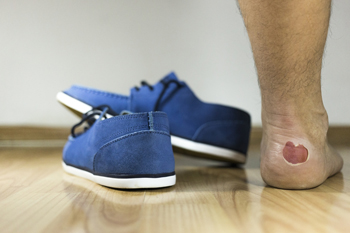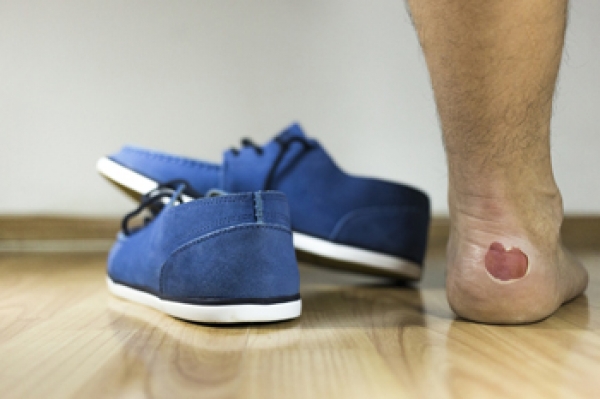 A blister generally forms as a result of excess friction. When a blister develops on the feet, walking, running, and performing daily activities may be difficult to accomplish. Blisters are considered to be common among those who enjoy sports and hiking. They are defined as a pocket of fluid that forms over the affected portion of skin, which is the body’s natural method of protecting the damaged skin. When new skin has formed, the blister will gradually drain. There are methods that can be implemented which may help to prevent blisters. These may include wearing shoes that fit correctly, and wearing socks that are made of breathable materials. Additionally, it may help to wear cushioned insoles that can provide extra comfort. If you are afflicted with blisters on the feet, it is advised that you speak with a podiatrist who can properly treat this condition.
A blister generally forms as a result of excess friction. When a blister develops on the feet, walking, running, and performing daily activities may be difficult to accomplish. Blisters are considered to be common among those who enjoy sports and hiking. They are defined as a pocket of fluid that forms over the affected portion of skin, which is the body’s natural method of protecting the damaged skin. When new skin has formed, the blister will gradually drain. There are methods that can be implemented which may help to prevent blisters. These may include wearing shoes that fit correctly, and wearing socks that are made of breathable materials. Additionally, it may help to wear cushioned insoles that can provide extra comfort. If you are afflicted with blisters on the feet, it is advised that you speak with a podiatrist who can properly treat this condition.
Blisters are prone to making everyday activities extremely uncomfortable. If your feet are hurting, contact Dr. Joshua David Scoll of Pennsylvania. Our doctor can provide the care you need to keep you pain-free and on your feet.
Foot Blisters
Foot blisters develop as a result of constantly wearing tight or ill-fitting footwear. This happens due to the constant rubbing from the shoe, which can often lead to pain.
What Are Foot Blisters?
A foot blister is a small fluid-filled pocket that forms on the upper-most layer of the skin. Blisters are filled with clear fluid and can lead to blood drainage or pus if the area becomes infected.
How Do Blisters Form?
Blisters on the feet are often the result of constant friction of skin and material, usually by shoe rubbing. Walking in sandals, boots, or shoes that don’t fit properly for long periods of time can result in a blister. Having consistent foot moisture and humidity can easily lead to blister formation.
Prevention & Treatment
It is important to properly care for the affected area in order to prevent infection and ease the pain. Do not lance the blister and use a Band-Aid to provide pain relief. Also, be sure to keep your feet dry and wear proper fitting shoes. If you see blood or pus in a blister, seek assistance from a podiatrist.
If you have any questions, please feel free to contact one of our offices located in Philadelphia, Bensalem, and Fairless Hills, PA . We offer the newest diagnostic and treatment technologies for all your foot care needs.

